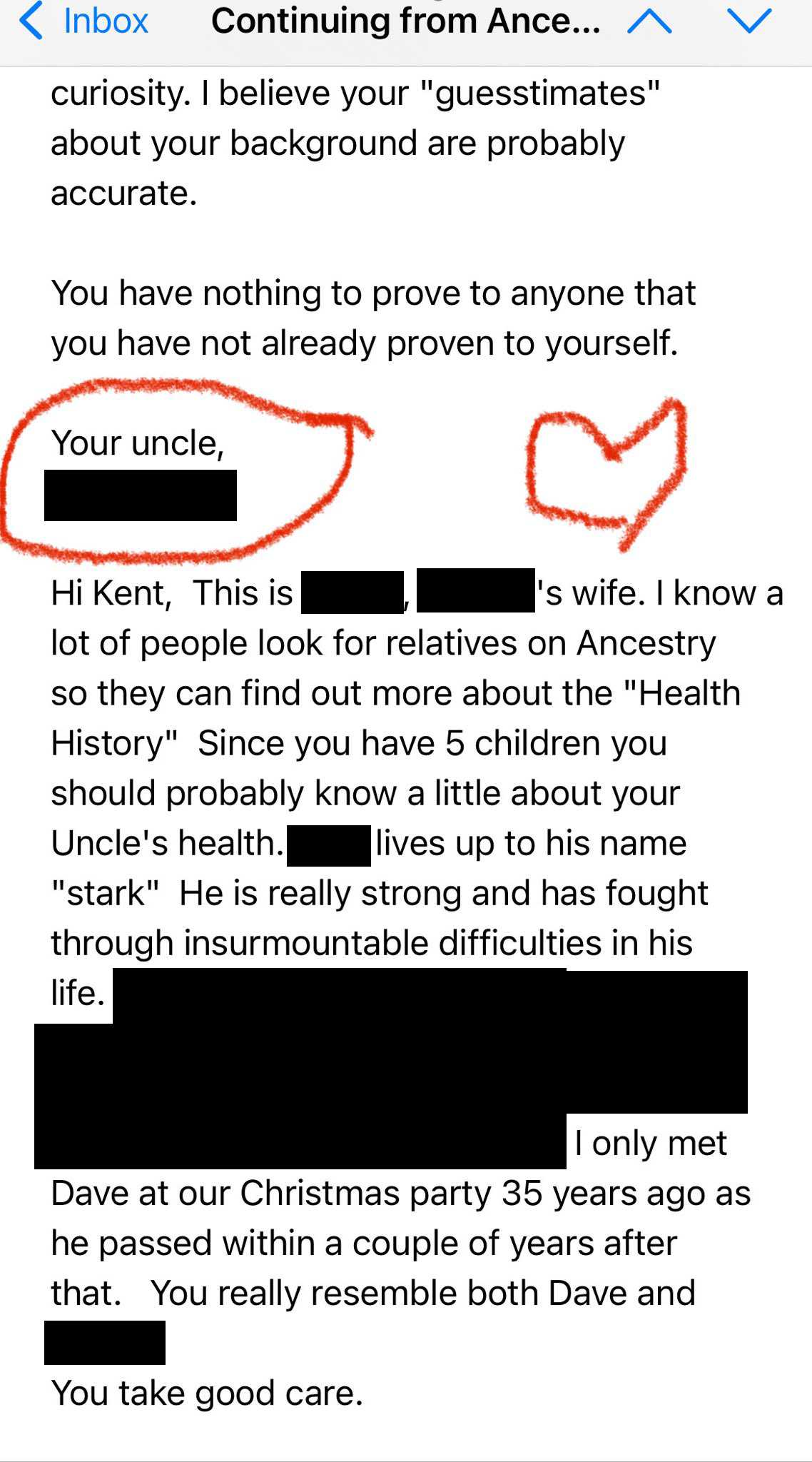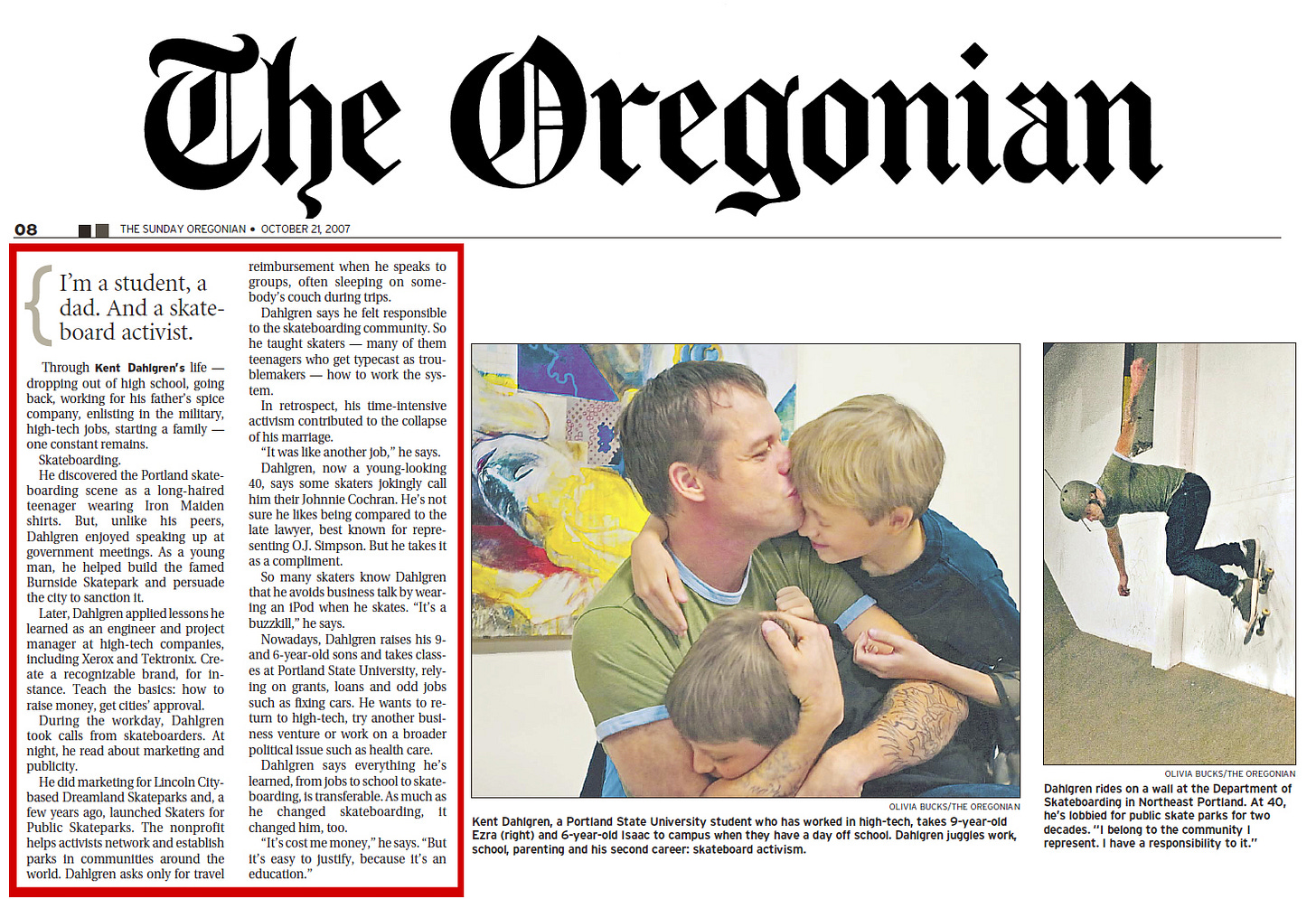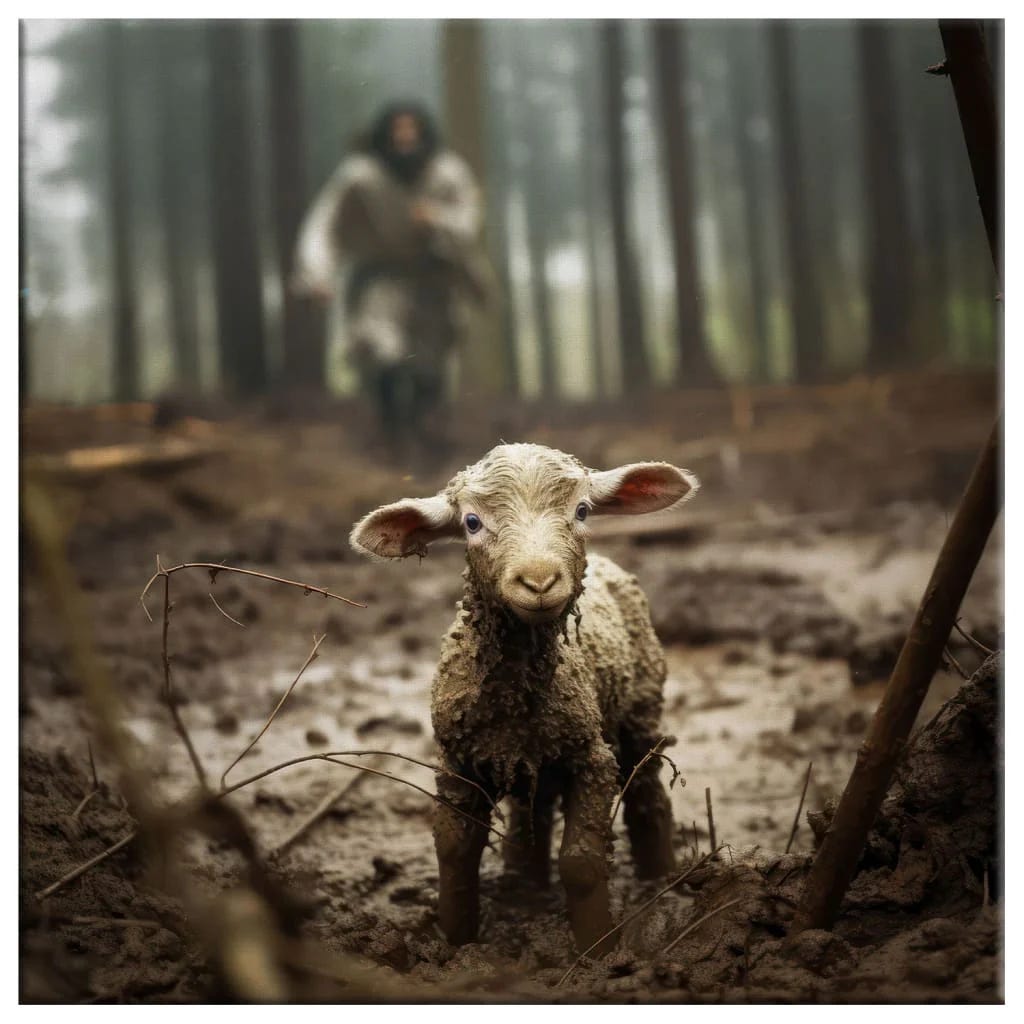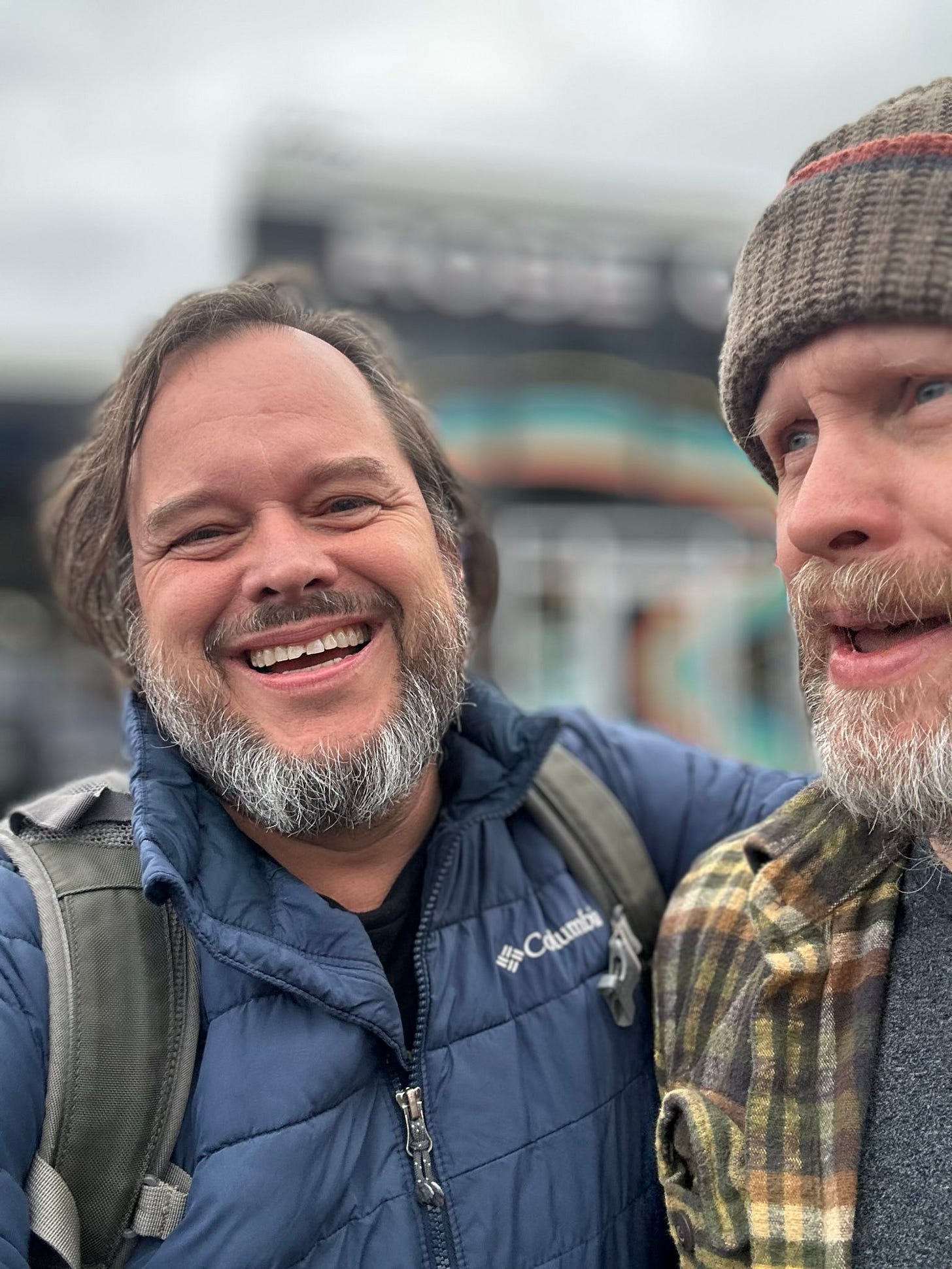The Early Christmas Present
"You have nothing to prove to anyone that you haven't already proven to yourself"
A few days before Christmas I accidentally learned that my father is not my real dad.

I went to the Ancestry web site to look at my DNA results, (which I’d submitted over a decade ago), and was surprised to see a paternal uncle with 26% shared genetic material.
This was odd; who is this guy?
Rewind 16 years ago.
Upon my grandmother’s death, I inherited 40+ years of her genealogical research, and almost ten years ago created an extensive family tree tracing my paternal line back over 1,030 years.
It was at this time that I submitted my DNA for analyses, which was added to the Ancestry site.
To my knowledge: my paternal grandparents had two sons, one of whom was obviously my dad, the other an uncle that is … different than the man listed.
The immediate implication was that this guy was a brother of my dad and my uncle, but that assessment was almost immediately put to doubt as the number of discontinuities began to grow.
I pinched my brow, and began to research and explore, trying to make sense of things.
What prompted my visit to the Ancestry web site?
My friend Ruth said in our group chat “your dad isn’t your real dad,” and I laughed.
People have joked about that my whole life, for few reasons, primarily because my temperament is nothing like that of my dad, and because I don’t exactly resemble my two brothers, case in point:
When I first entered my DNA material into the Ancestry web site, their features weren’t as mature as they are today, so I wasn’t able to derive any remarkable insights about my genetic heritage, other than “northern European.”
And anyway, I lost interest in maintaining my Ancestry membership, and in time it lapsed, so my recent tour of their DNA report was pretty confusing the more I searched for answers regarding this mysterious uncle.
Wait. I’m not Swedish?
This part was a shocker; I can trace my Dahlgren lineage back into the early 1600’s, deep into Sweden. My paternal great-grandfather Nels Oscar Dahlgren was born in Sweden, and I can trace his journey to Liverpool, then Boston, on the HMS Saxonia.
Now, I’m aware that the regional analyses aren’t 100% precise, but still: 0% Swedish?
Additionally, the DNA analyses said that my genetic heritage is:
24% Germanic Europe
16% Scottish
8% Irish
But none of the 1,818 individuals who in my family tree were born in Scotland, Ireland, or Germany.
Bizarre.
So I decided to do something novel: trust the DNA findings over the family tree.
Let’s take another approach
Ancestry allows you to create different family trees, and so I created a new one, listing this man “Stark” as my paternal uncle.
Ordinarily, Ancestry doesn’t allow you to see data associated with those who are still living, but those who submit their DNA to Ancestry opt into something of a “back door,” allowing close genetic matches to see a little bit of their family trees.
With this as my guide, I populated my newly-created family tree with the man’s deceased parents, listing them as my paternal grandmother and grandfather, and before long I was looking at:
three deceased aunts
one living uncle
and: my dad (deceased)
Huh. Guess I am Scottish, Irish, and German. Cool.
So I did the normal thing.
I contacted my uncle and said hello
I sent him a message on Ancestry, and he wrote back within a couple of days. We corresponded. That was really nice.
I told him about myself, and he told me about my dad. It was great to hear how he and I were very similar, which was very validating, and then my uncle delivered the best Christmas present I’ve ever received: he addressed himself as my uncle.
Just like that, the coins began dropping
It’s always been a point of vexation why my immediate and extended family has treated me like an unwanted houseguest, even though by most standard measures I’m an accomplished person of high ambition.
Suddenly, I got it. It had nothing to do with me; I merely served as a secret and a lie they wanted to forget about.
My grandparents were great patrons
And as long as they were alive they made sure I was made to feel welcome. My paternal grandma took care to cut each mention in the media and place it in an album of my accomplishments, but that policy dried up as soon as they passed, and it’s been puzzling.
When I’ve earned an mention in the media, such as this recent acknowledgement of my work, my family closes ranks and presses their lips together in alarm and disgust.
I’ve asked: what’s the deal?
I was highly-recognized for outstanding achievement in the military (USAF 1996 Group “Airman of the Year,” two Air Force Achievement Medals, one Air Force Commendation Medal), have been acknowledged for civic excellence for years (Wall Street Journal, New York Times, etc), and my career accomplishments are above and beyond.
Why the absence of enthusiasm? Why the angry faces each time I show up in the media?
Answer: it had nothing to do with me.
This whole time I’ve thought of myself as a Dahlgren - and I am - but I learned from my uncle that it’s the “Stark” in me that made me a poor fit.
This goes beyond outward appearances.
In our correspondence my uncle described he and his brother’s respective life journeys, and I said “well, it’s as if you’ve just read to me my career’s performance reviews.”
Ah ha: this is why I am committed to helping other strays create community
This is one of those things where the experience itself is the closure I needed to move fully into a new phase of my life.
Part of achieving that closure is realizing that this is why I’ve invested so thoroughly to create a solution for “the other misfits, orphans, and strays.”
Because that’s what my company is: the economic engine for those who aspire to create their own communities, which may include cooperatives, intentional communities, or even small towns.
I grew up at the feet of giants in my grandmother’s kitchen
I can still hear the echoes of their laughter, even though my grandma and her siblings are long gone.
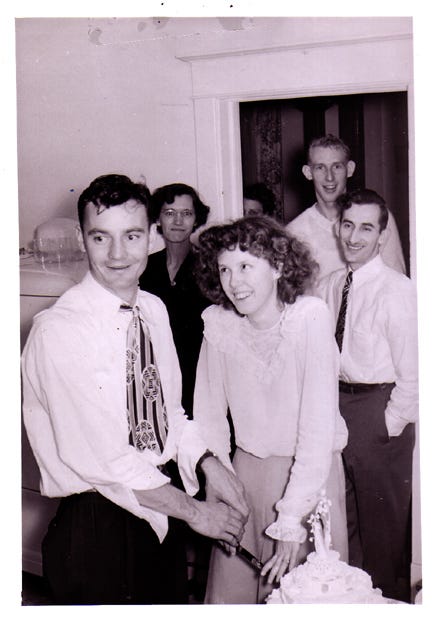
They were hardscrabble people, and the Great Depression was hard on them; they lost parents and siblings, and so they welcomed and embraced “misfits, orphans, and strays” as one of their own.
For a while, I was part of that glorious diaspora; at least I caught the tail end of it, and when they died I was left to think about how to inspire the creation of a “starter yeast” that would invite people to rediscover the healing power of ad hoc community.
That’s the starter yeast of 214 Alpha.
There wasn’t anything wrong with me; I was a Stark raised by Dahlgrens, and didn’t know it until I was 57. Bizarre.
The name Stark means “strong,” “sturdy,” “and having great determination”
Well, yes. That fits.
But let me pivot a little bit and talk about my brother Kevin, because I am still a Dahlgren, and he’s the first person I called when I realized that I’d found my real dad.
My brother: Kevin Dahlgren, whose name means “beloved birth”
Tattooed on the inside of my sword arm is a rendering of the “Good Shepherd,” which makes reference to John 10:11-15, a parable where a shepherd leaves the 99 sheep to find the one that’s missing.
Well? That’s what my brother Kevin does; he’s looking for the one that’s lost.
Our youngest brother was left to the streets as a teen, and today’s he’s clean and living a good life, but Kevin is still looking for his brother, for “he is his brother’s keeper,” and this is clear to all but the cynics when you watch his videos, where he gives the homeless a voice.
And the cynics can’t see it because they are ideologically rewarded when the homeless experience more suffering, whereas Kevin takes the suffering of the homeless personal, and is driven by bitter pragmatism to find solutions, even if the solutions aren’t perfect or ideologically pure.
Our maternal grandma Ruth knew that our parents weren’t that engaged in parenting, and she would counsel that we “take what we like and leave the rest,” challenging us to step out of a victim narrative, and transform our hardships into gifts.
Well, I think we’re doing that.










